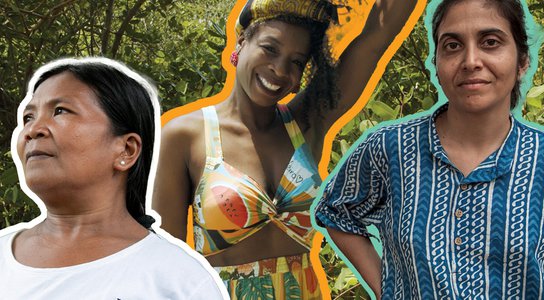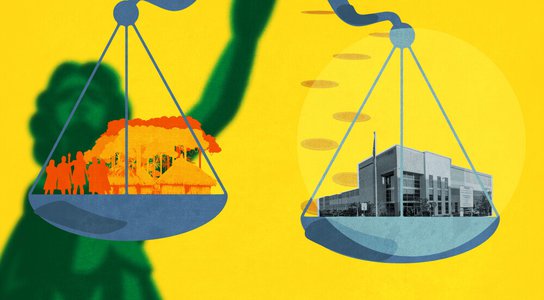European banks and investors – including Deutsche Bank, Crédit Agricole and Intesa Sanpaolo – are investing over €700 million in two companies that are helping fuel violence against the people of South Sudan, which the UN says could amount to complicity in atrocities and war crimes.
European creditors have also provided over €4 billion worth of loans and underwriting services to the two companies in under seven years.
South Sudan’s population has suffered horrific violence for decades. Conflict erupted in South Sudan in 2013, subjecting civilians to extreme forms of abuse, such as mass killing, mass rape and torture. Some of the warring factions signed official peace agreements in 2015 and 2018, but government forces, allied militias, and security services continue to perpetrate acts of violence against the country’s people. The UN Commission on Human Rights in South Sudan has recommended that those responsible be investigated for crimes against humanity and war crimes. Their investigator stated that those involved in South Sudan’s oil extraction could be complicit in these crimes.
Countless reports have explicitly warned companies operating in South Sudan’s oil sector that they risk contributing to serious abuses. Global Witness’ investigation reveals that these are the companies that European banks and investors choose to fund and lend to – and have made money from since the conflict began in December 2013.
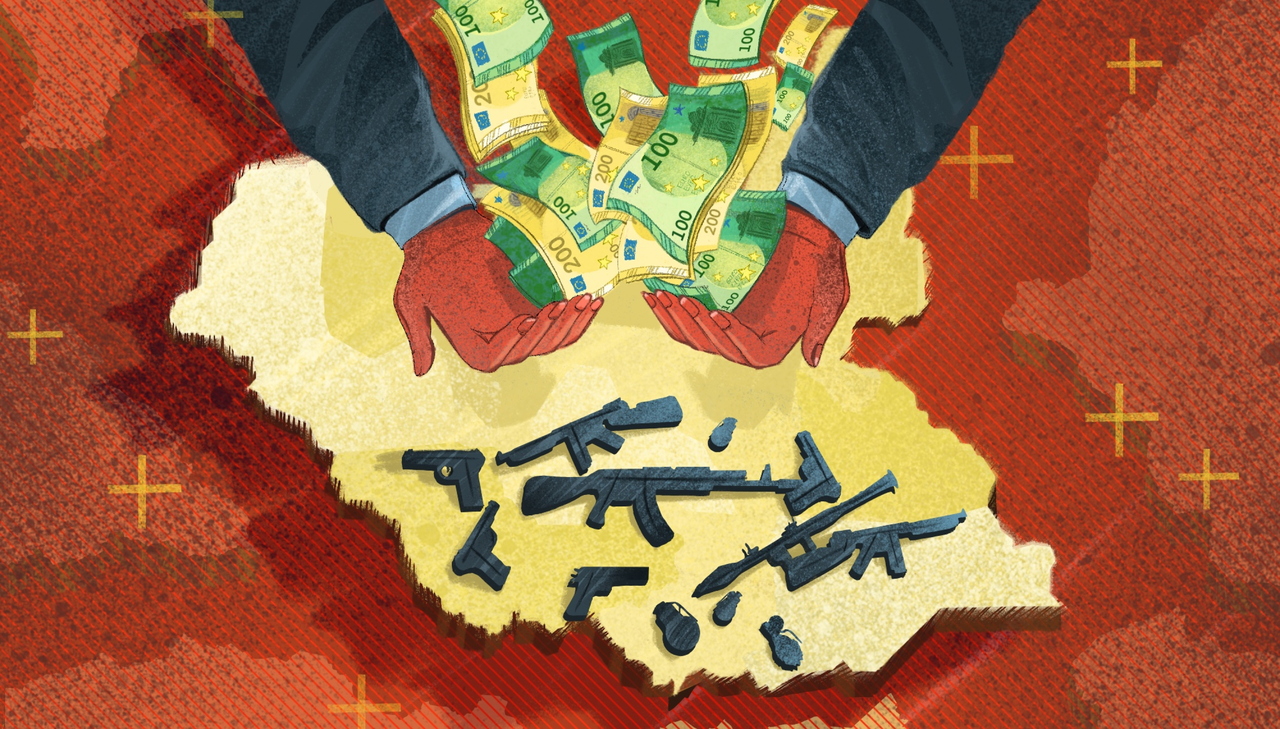
The wrong investments
For years, governments – including those of the United States and the United Kingdom – international organisations and investors have recognised that companies extracting oil in South Sudan can, and have, helped fuel abuses and violence against civilians. Experts have published extensive information about the human rights violations perpetrated by South Sudanese government forces, as well as the links between those forces and the oil sector.
In 2018, the three joint ventures that run oil-extraction activities in South Sudan were all placed on the United States Entities List, which names those whose activities contravene US security or foreign policy. The US Department of Commerce concluded that the companies were contributing to South Sudan’s ongoing crisis. It stated that it listed them because they were “a source of substantial revenue that, through public corruption, is used to fund the purchase of weapons and other material that undermine the peace, security, and stability of [the country].”
The United Nations later wrote that the listing is a “stark reminder that these companies have been found, as a consequence of their business activities, to have caused or contributed to the ongoing armed conflict and the violations against civilians in their areas of operation.”
Yet European banks and investors are still investing millions in the two international companies with the biggest stake in South Sudan’s oil sector, and have continued to lend to them since conflict erupted. Petronas, a Malaysian company, and the Chinese National Petroleum Company (CNPC) together own a majority of the joint venture that produces 75% of the country’s oil. This joint venture remained operational and was producing oil after the conflict began in 2013. CNPC also owns shares in one of South Sudan’s other two joint ventures, and Petronas owns shares in both.
Should they have known?
Investors have chosen to pull their money out of much smaller players in South Sudan’s oil-extraction business because of their suspected role in the violence. In 2021, Norway’s government pension fund – the world’s biggest sovereign wealth fund – said it would exclude the Oil and Gas Corporation (ONGC) from its investments. KLP – Norway’s largest life insurance company – followed suit the same month.
ONGC is an Indian oil company engaged in the production of oil in South Sudan. It is a junior partner in two consortia primarily owned by CNPC and Petronas. The two joint ventures that it participates in only produce roughly 25% of the country’s oil. Though ONGC has a smaller stake in South Sudan’s oil sector, the Norwegian pension fund’s Council of Ethics suggested that the company risked contributing to atrocities that could amount to war crimes and crimes against humanity.
● The Dar Petroleum Operating Company (DPOC) is responsible for the majority of South Sudan’s oil production. It operates in former Upper Nile State as a partnership between Nilepet (8%), CNPC (41%), Malaysia’s state-owned oil company Petronas (40%), Sinopec (China) (6%), and Tri-Ocean Energy (Egypt) (5%).
● The Greater Pioneer Operating Company (GPOC) operates in former Unity State and resumed production in 2018. It is a partnership between Nilepet (5%), CNPC (40%), Petronas (30%), and ONGC Videsh (India) (25%).
● The Sudd Operating Company (SPOC) has only recently resumed production. It is a partnership between Nilepet (8%), ONGC Videsh (24.2%) and Petronas (Malaysia) (67.8%).
According to the budget obtained by Global Witness, between July 2022 and March 2023, DPOC contributed roughly 75% of production, GPOC 23% of production and SPOC the remaining 2%. Private companies in the joint ventures claim a significant proportion of oil production.
The Council of Ethics concluded that there was an unacceptable risk that ONGC is “contributing to serious violations of the rights of individuals in situations of war or conflict”. It found that ONGC was helping generate oil revenue likely used to finance abuses and was working jointly with actors responsible for extremely serious violence – behaviour that investors could not accept.
Despite this conclusion, banks and investors from across the EU, including in Germany, France and Italy are still backing Petronas and CNPC. They are supporting companies that have operated throughout a decade of war and violence, which continues to this very day. Since the start of the conflict in 2013, European banks and investors have made money from investments in these two companies. Meanwhile, the South Sudanese people have suffered countless abuses financed by oil money.
What kind of violence are banks and investors tied to?
[Trigger warning – violence, sexual violence]
South Sudan’s population has known little peace. After gaining independence from neighbouring Sudan in 2011, South Sudan was plunged into conflict in 2013. The civilian population was subjected to extreme forms of abuse, including torture, mass rape and mass killing. The violence displaced millions, in what the UN described as the largest refugee crisis since the Rwandan genocide.
Some warring factions signed the latest peace agreement in 2018, but government and government-allied forces continue to kill and terrorise civilians across the country. Several organisations have documented the brutality of the military, police and security services in South Sudan, before and after the 2018 peace agreement. In a report on 2018 attacks, the UN said that as well as pursuing political and military objectives, the government offensive was aimed at “either pacifying or removing civilian population from the areas near the oil fields by using extremely violent methods”.
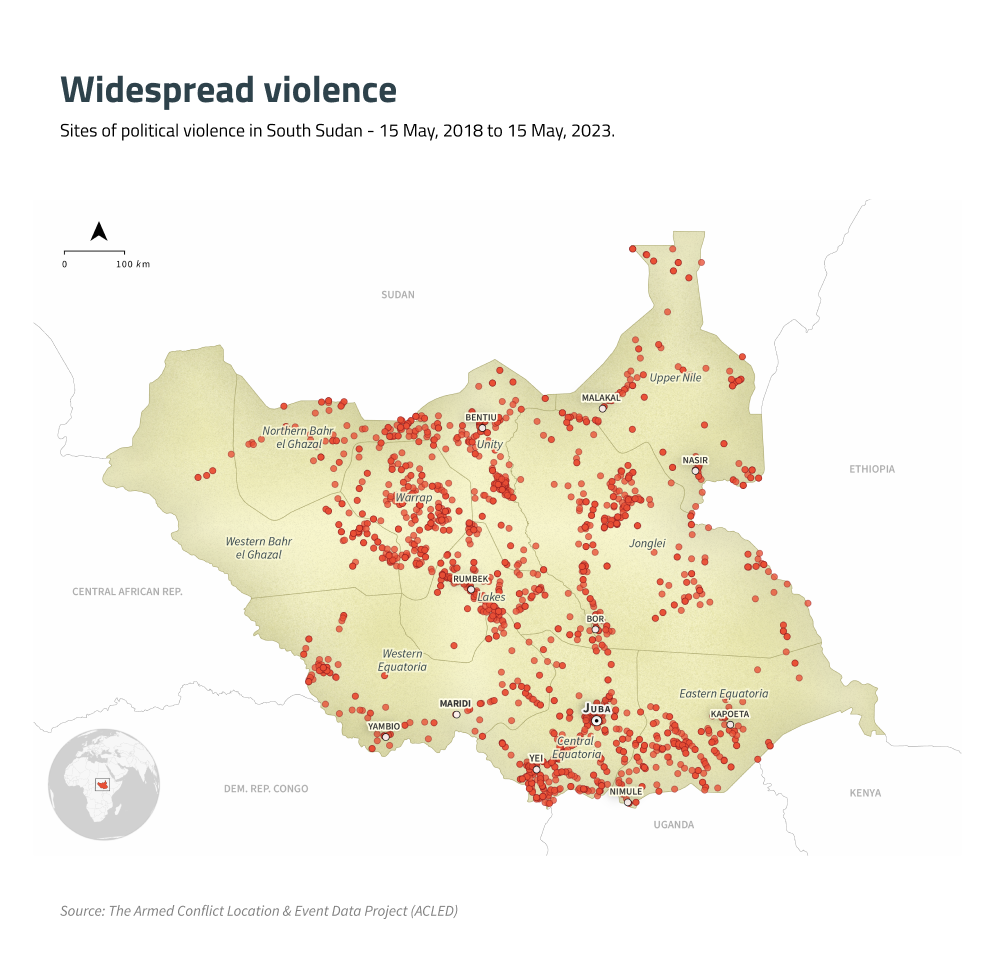
In 2022, the UN warned of serious violations of international human rights and humanitarian law as the military attacked and displaced civilians. It reported that armed groups killed approximately 173 civilians, raped or gang raped 113 women and 18 girls, abducted 26 women and 11 children, and forcibly displaced an estimated 44,000 civilians – all in the space of less than four months.
During the 2022 attacks, joint government forces and allied militias allegedly used ‘scorched earth’ tactics. They stormed villages and settlements, and randomly attacked unarmed civilians, including women, children and elderly people. According to the report:
“Victims were killed as a result of random shooting, while others died of fatal injuries and beheading by machetes and bayonets, and by being intentionally thrown into huts [...] and set on fire. The attackers also burnt alive children and older persons who could not flee their homes. Children were also intentionally drowned in the swamps by the attackers.”
The UN has also emphasised the systematic use of sexual violence in South Sudan. It has documented the military’s role in abducting, sexually enslaving, sexually torturing, beating and inhumanely treating women and girls. It stated that sexual violence is used to reward combatants and severely disrupt communities.
Witness testimony showcases examples of the horrific trend:
“Two elderly women and a four-year-old girl and another young boy were burnt alive in tukuls [round homes in Eastern Africa]. A man and woman of 70 years old were strangled to death… another shot and killed by two men. Then they gang-raped three of the women, including one nine-year-old girl whom they gang-raped to death.”
Account of witness from Adok
The UN has found that gang and mass rape at the hands of the military “appears to involve a high degree of planning and deliberate intention”. It even sanctioned the country’s most senior military commander alongside other senior officers – a measure it has rarely taken.
How are oil companies tied to the violence?
The companies extracting South Sudan’s oil work in partnership with the state-owned oil company, the Nile Petroleum Corporation (Nilepet). By working in joint ventures with Nilepet and in cooperation with government military and security forces, international companies generate revenue that government forces have used to finance violence against civilians. Indeed, UN reports emphasise that the military’s behaviour demonstrates its intent to target civilians.
There are four concrete ways in which these oil companies help fund conflict and abuses:
1. Oil companies provide the government with oil revenue, which it uses to fund its military operations
Most of South Sudan’s budget comes from oil money – an expected 84% of it, according to the 2023/24 draft budget obtained by Global Witness. The real figure is likely to be even higher, as end-of-year accounts can show an even greater reliance on oil. Previous expenditure reports have shown that 98% of revenues came from oil proceeds.
The budget also showcases that the principal beneficiaries of oil revenues are the security forces. Several reports confirm that the bulk of the government’s budget is allocated to military and security services. By the end of the third quarter of the 2022/23 financial year, the security and rule-of-law sectors had spent over SSP 88 billion (US$675.6 million) combined, while the health and humanitarian sectors had spent less than SSP 10 billion (US$76.8 million). A recent government report on the use of funds received from the IMF also identified over 420,162 security sector employees on the government payroll, accounting for around 89% of all government employees.
That said, widespread corruption in South Sudan means that spending is higher than official figures indicate, and is allocated through unofficial channels. A lot of the money spent by the government is never disclosed, meaning the full picture is worse than the official budget suggests.
International oil companies therefore help generate the oil revenues that are used, both officially and unofficially, to fund the country’s security sector – while making significant profits on these operations. In 2018, the UN confirmed that “oil remains the major source of finance for the government’s war efforts”.
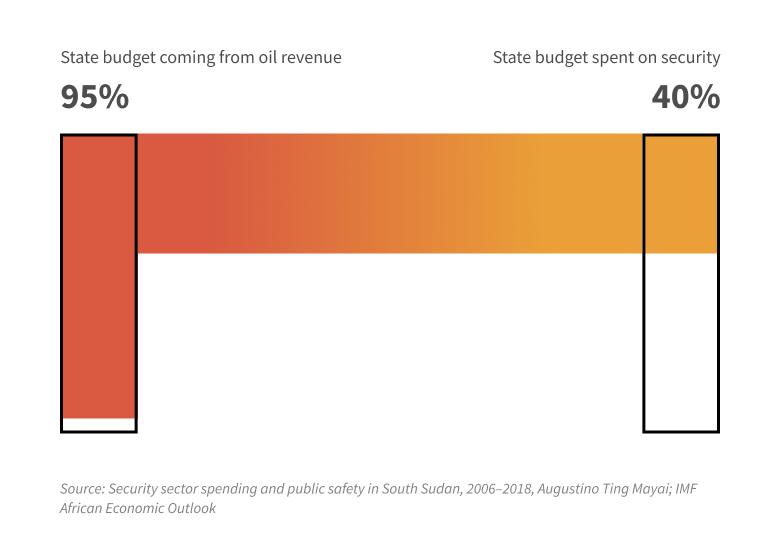
2. Oil companies work with, and generate profit for, the state-owned oil company Nilepet – which reportedly channels oil money into military operations
Nilepet is a partner in all three of South Sudan’s joint oil ventures. Embedded in the country’s oil sector, the company is also a key player in the misappropriation of money.
Nilepet has repeatedly been accused of diverting oil revenues to the National Security Services (NSS) and ethnic militias. The Sentry, an investigative and policy organisation, reported that between March 2014 and June 2015, Nilepet facilitated the payment of over US$80 million of assumed oil revenue for services to government-allied forces implicated in atrocities. Similarly, Global Witness found that the government was requesting payments from Nilepet to cover military operations in conflict areas. In 2015, news website Africa Intelligence stated that much of Nilepet’s revenues had been earmarked to pay as many as 210,000 soldiers. In 2016, the UN concluded that Nilepet authorised the purchase and transfer of weapons to government-allied militias.
These payments are facilitated by the fact that Nilepet is a private company. Its expenditures are subject to considerably less oversight and scrutiny than those of government ministries, and the president and his allies can exercise far greater direct control over Nilepet than over ministry operations. The South Sudanese President, Salva Kiir, and his inner circle have long controlled Nilepet. The powerful director of South Sudan’s brutal security services, Akol Koor Kuc, sat on Nilepet’s Board of Directors. The UN states that Nilepet acts in the interests of the NSS and senior members of the South Sudanese government.
Evidence suggests that assets were deliberately diverted away from ministries and into this relatively opaque company at key moments during the conflict. The UN has since confirmed that the company has been used to finance ongoing conflict.
3. Oil companies pay – and work with – the National Security Services (NSS), which participates in the conflict
Oil companies also directly fund the NSS. South Sudan's oil industry is heavily militarised and driven by security interests. Security at the oil fields in which the joint ventures operate is ensured by participants in the conflict; the NSS is legally required to provide security at oil fields, in cooperation with the national police. The UN states that NSS officers were stationed both at the joint-venture headquarters and at the oilfields, and that the military also protect the oil operations.
So companies can only operate if they agree to have their operations secured by the brutal NSS, or an affiliated security company. They pay for these services through the Ministry of Petroleum. According to the UN, companies in the oil-consortia have also made direct in-kind contributions to the NSS and the military. These are the groups that stand accused of atrocities against local populations.
4. Oil companies work on heavily contested territories. To secure them, armed groups have inflicted unspeakable violence on civilians
Control of the petroleum resources, and of the oil fields, is a key driver in South Sudan’s ongoing violence. In 2019, the UN stated that the armed conflict in South Sudan was being driven primarily by the need to control the oil-producing areas in Unity and Upper Nile states – where the joint ventures are situated. It asserts that this aim “has been a major driver of the continuing ethnic violence, which has led to enormous human suffering and violations of human rights and international humanitarian law.”
European investments continue
Despite widespread evidence of the links between oil companies and the violence in South Sudan, European banks and investors from across eleven EU countries – including the likes of Deutsche Bank, Allianz, Crédit Agricole and Intesa Sanpaolo – are investing over €700 million worth of bonds and shares in Petronas and CNPC, the two biggest joint-venture partners in South Sudan.
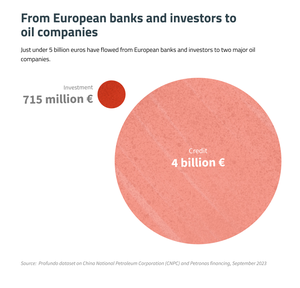
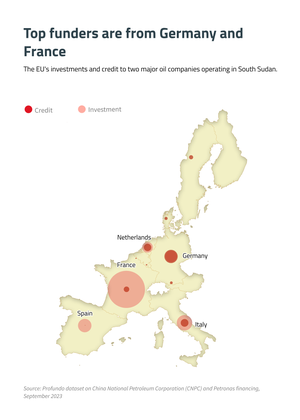
Methodology
Global Witness worked with Profundo, Dutch not-for-profit financial analysts, to identify the earnings generated by EU financial institutions from their investments in the two oil and gas groups CNPC and Petronas. As part of this research, Profundo identified the investments made by EU financial institutions in CNPC and Petronas and their listed subsidiaries, and captured investments in all subsidiaries in its final analysis. This research relied primarily on financial databases Bloomberg and Refinitiv, as well as project finance data from IJGlobal to identify the creditors of the selected companies. Creditor data was retrieved from January 2016 to August 2022, and is accurate as of August 2022. Shareholdings were researched at quarterly intervals from Q4 2013 to Q3 2023, and are accurate as of the most recent filing data available through consulted databases in September 2023. Investments and credit provision are aggregated at the parent level, attributed to the parent financial institution and not distinguished from managers in the final analysis. For example, Deutsche Bank is listed for investments by DWS, its subsidiary.
Analysis
The following chart presents a breakdown of the top European investors in the two companies.
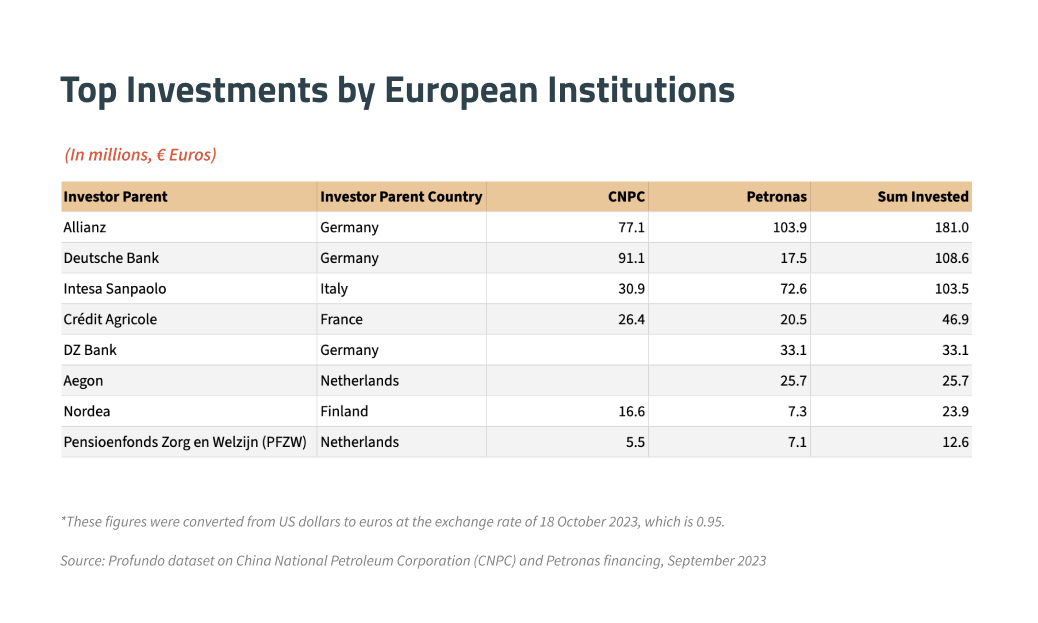
Several European creditors have also continued to provide loans and underwriting services to the two companies, for a total value of over €4 billion in under seven years. Between January 2016 and September 2022, European banks and investors, including BNP Paribas, Crédit Agricole, and DZ Bank, provided nearly €4 billion in loans to Petronas. Crédit Agricole and Société Générale also provided underwriting services of over €250 million to CNPC.
The following chart presents a breakdown of European creditors in the two companies between January 2016 and September 2022.
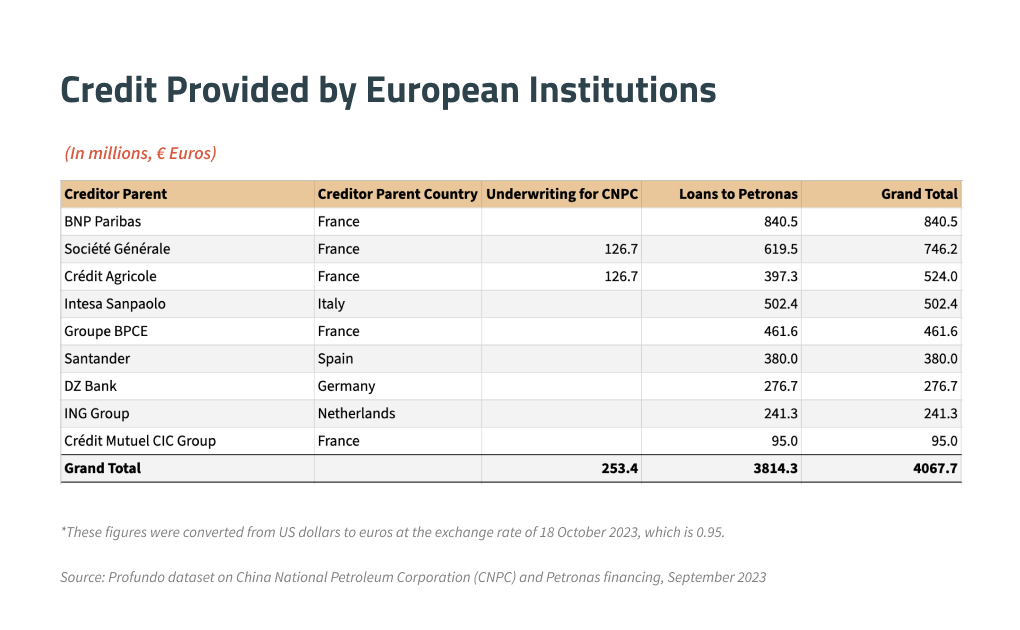
Santander, BNP Paribas and Deutsche Bank stated that they do not comment on information relating to clients or specific transactions, and claim to have adequate social, environmental and climate change risk and international sanction management policies in place.
Deutsche Bank further emphasised its commitment to net-zero and asked to be distinguished from its asset management arm, DWS. DWS stated it takes its responsibility regarding respect for human rights very seriously and emphasised its sustainability policies.
Groupe BPCE and Pensioenfonds Zorg en Welzijn (PFZW) denied that they are financing the companies. They did not respond when Global Witness provided them with its underlying data.
Nordea claims its investments respect business and human rights principles and pointed to Petronas’ plans to sell its South Sudanese assets. In its initial response, Nordea claimed that it no longer has any investments in CNPC. Upon receiving Global Witness’ data, Nordea claimed that its asset management had initiated the process of excluding CNPC subsidiaries.
Crédit Agricole does not confirm the investment figures that Global Witness shared with them and declined to provide further comment on their investments after receiving the data. They confirm their exposure to CNPC and denied having any exposure to Petronas since 2014.
When Global Witness shared figures about their loans to Petronas in 2019 and 2021, Crédit Agricole said it did not understand the source of the credit provision figure. As indicated in the dataset, the figures are sourced from IJ Global and Bloomberg, a project finance and infrastructure journal and a financial transaction database that provide access to financial transaction information.
Other banks and investors did not respond to Global Witness’ opportunity to comment on these findings.
While the oil companies continued operating in South Sudan, they provided revenue to the South Sudanese government and cooperated with its security and military forces, who are accused of atrocities against civilians. These include mass killing, mass rape and torture. These are the companies that banks and investors have continued to fund and lend to.
Changing 'business as usual'
This investigation has shown that despite overwhelming evidence of harm, banks and investors continue to bankroll companies that cooperate with forces accused of egregious violence. But they can be made to change how they conduct business.
The European Union could help ensure that banks and investors are required to check that their investments and loans aren’t fuelling harm. EU policymakers are negotiating the final version of a law – the Corporate Sustainability Due Diligence Directive (CSDDD) – that would oblige large companies operating in the EU to ensure they are not harming people or the environment.
Unfortunately, some policymakers want to let financial institutions off the hook and exempt them from the rules that would apply to other companies – or leave them out of the law altogether. This means that they could continue backing companies tied to serious abuses.
Through their investments and loans, banks and other financial institutions showcase what kinds of companies – and behaviours – they are willing to endorse. Their decisions can help prevent human rights and the environmental abuses worldwide.
By making sure banks and investors are covered by the CSDDD, policymakers have a chance to reject the notion that human rights abuses can be part of ‘business as usual’.
- Download the full report (3.7 MB), pdf
Please note that all endnotes for this report are available in the PDF.
Contact
-
Aurelie Skrobik
Campaigner, Corporate Accountability
